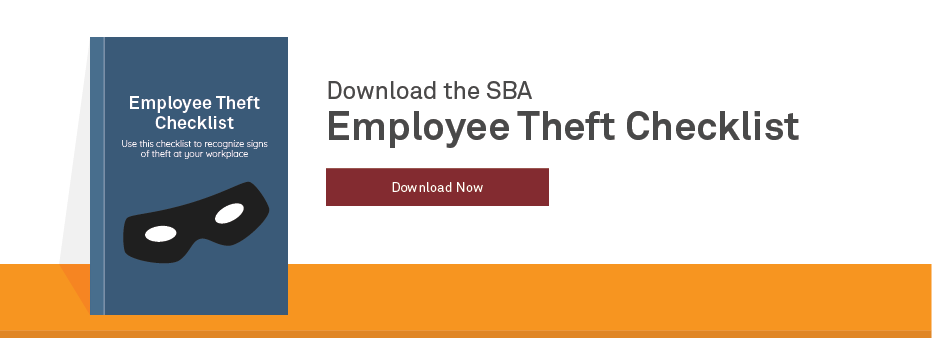The Association of Certified Fraud Examiners, estimates that organizations lose 5% of revenue to occupational fraud each year. In fact, 86% of occupational fraud involved stealing.
Given the likelihood that you will confront employee theft as a small business owner, you should consider preparing how to respond. Missteps can disrupt your workplace and lead to lawsuits, compounding an already difficult situation.

Tips on Detecting and Handling Employee Theft
These guidelines can help you take wise and prudent action when you believe an employee has stolen from your business.
Know the Signs
Employee theft can take many forms—from stealing cash and merchandise to padding time and committing fraud—and may be difficult to detect. Your first step is to be alert to telltale signs, such as:
- An unexplained drop in profits
- Petty cash that is quickly depleted
- Missing inventory
- Payroll and expense discrepancies
- Undue travel expenses
- Disappearing office supplies
Also beware of employees who work late and never take time off. They may be the workplace ideal (as opposed to those who always call in sick), but could be the perpetrators of theft along with those whose lifestyle and income don’t match.
Evaluate the Situation
Unless you catch an employee red-handed, it’s important to not jump to any conclusions about a suspected theft and who’s responsible. An employee who is falsely accused could sue you for defamation.
Begin by taking stock of the specifics:
- What was stolen?
- If items are missing, could they have been misplaced or taken by accident?
- What is the cost to your business?
- When did the incident occur? Was it a one-shot deal or has it persisted over time?
- Who do you believe is responsible?
Conduct a Thorough Investigation
If you’re convinced that theft has occurred, conduct a thorough investigation to gather the evidence you need to prove your case beyond a reasonable doubt. Consult your attorney for guidance, and take these steps without delay:
- Begin promptly so the statutes of limitations don’t run out. These vary by state and by the value of the loss; your attorney can advise on the timeframe that applies to your case.
- If the theft is complex or substantial, hire an outside expert such as a trained forensic accountant to assist in the investigation. An outsider will bring not only the specialized knowledge you need but also a neutral perspective.
- Collect all relevant documents and evidence, from financial records and personnel files to accounting records and surveillance videos.
- Gather the perspectives of any witnesses through one-on-one interviews. Before you meet, formulate the questions you wish to ask to ensure you cover all key points. Take detailed notes.
- Establish confidentiality guidelines for everyone participating in the investigation, including investigators and employees. This will help prevent leaks and minimize the fear of retaliation among employees who disclose sensitive information.
- To corroborate the evidence you have compiled to date, present your case to the employee you suspect of theft. Make it clear to the employee that this is a preliminary interview to capture their version of the story, not to secure a confession. Focus on the facts and communicate in a respectful, even-handed manner.
- Document your findings in a detailed written report and gather the signatures of those who participated in the inquiry. Together, these constitute a strong form of evidence that can help you uphold your case in a court of law and can defend against any actions taken by the accused that purport wrongful discharge or defamation.

Know the Law
When investigating employee theft or employee fraud, always bear in mind these legal constraints regarding employee privacy:
- It is a federal crime to wiretap or otherwise record the communications of others without court approval or prior consent of one of the parties. It’s also against the law to use or disclose information acquired in this manner.
- Video cameras are generally permitted providing they do not use audio and employees are notified of the surveillance activity.
- Some states have additional limitations on how and where employees may be monitored. Check with your state labor agency to ensure your actions comply with the law.
Other legal considerations apply to the manner in which you conduct your investigation. If you use an overly aggressive approach, an employee can claim that you intentionally inflicted emotional distress. If you suspect, accuse or fire an employee based on the suspicion of theft without clear-cut evidence, you can be sued for defamation.
Mete Out the Proper Consequence
Once you have evidence of the theft, its extent and the wrongdoer, determine the punishment that suits the crime. For serious offenses, such as employee fraud with a high dollar value, termination may be your only option. Just be sure to follow all regulations governing employee dismissal. You may also choose to report the matter to law enforcement and press criminal charges. For petty theft, a written warning, probationary period and restitution may be sufficient.
Present the evidence and disciplinary measures to the employee in a confidential meeting. Have one other person in the room to deter any aggression that may arise.

Prevent Employee Theft
The best way to respond to employee theft is to prevent it from occurring in the first place:
- Use caution when recruiting. Insist on references and validate them. Require criminal background checks of all new employees.
- Implement internal controls to safeguard your assets. Separate accounting duties so no one employee is responsible for both recording and processing a transaction. Restrict access to your assets and accounting systems.
- Develop policies and procedures related to fraud and spell out the disciplinary measures for violations. Train employees on these topics annually.
- Monitor your employees and operations to keep your staff honest, but steer clear of micromanaging employees unless it’s welcome or necessary.
- Perform routine financial audits.
- Check stock and equipment on a regular basis.
- Provide an anonymous means for employees to report suspicious activity.
Employee theft in the workplace can be a significant drain on your business. Preventive measures, ongoing vigilance, and a prompt and thorough response to any suspected incidents can help you keep your business resilient and your employees honest.







At a discount store, items for sale are all donations (mostly brand new with brand name tag on each item). Sometimes I sell items with additional discounts to customers. For example: if a ball is priced $2.59, I would let the customer pay for only $2.00. (Sometimes with the management approval.) No money ever gets into my pocket! Management called my attention in a meeting and told me that what I did was “store thievery” of $54.59; then, fired me. and escorted me out of the store. Before I left the store, I paid back $54.59 w/receipt.
As the store cashier, I never thought of giving the customers additional discount as “stealing from the store.”
Fantastic!
Thank you!
Thank you so much!
It was fantastic and educative…
You’re welcome! We’re glad you enjoyed it.
Thank you a bunch for sharing this with all of us. You really know what you are talking about!
Thanks for the comment! Glad you liked our article.
This happened to me! It was my manager and I had full trust in him. This was the worst sucker punch in my 21 years in business. I also considered him a close friend but I was duped. Please watch your accounting closely. The trust factor is the hard part – you can’t do all the work yourself so you have to rely on others. Once this happened we went back to old customers to audit our records and several confided in us that the same thing happened to them but they were too embarrassed to admit it or press charges and it go public. Please, press charges. If not they become someone else’s problem and that’s not right they must be stopped. My audit is now in it’s 13th month and we won’t be done until end of this year probably but we’ve found over $50,000 in losses so far and expect it to go higher because we haven’t touched our cash accounts yet. This is real and it sucks!
The biggest issue when it comes to theft is also when staff, employees or paid contractors decide to utilize the time that you are paying them to take care of items that that nothing to do with what you are paying them for. They are stealing from you and they probably are not really aware of the real, after you add up the hours, the long term impact. That is why it is such a concern because everyone knows that stealing inventory and or cash is a criminal act, so they will probably avoid doing so, but people have no issue stealing time. Frankly, I could deal with small discrepancies with such as office supplies, odd travel expenses and such. It is, from my estimation, 10-20% of the time I pay them that I get nothing in return that hurts.
I agree, but the New World is of people that doesn’t know domestic economy, splurge and go broke, I try to help them to reshape their life style, and make good use of their money, to prevent theft
This might be accurate. Most employees think they should be paid more than they earn, so that would provide motive for theft to occur.
The question is why would 75% admit it?
Nobody likes to think about this topic, however speaking as a business owner, there are few things that will keep you up at night more than suspicion of an employee of stealing from you.The US Chamber of Commerce claims that 1/3rd of businesses that fail, do so as a result of employee theft.
Many good points in this article, and many tools to help. Sometimes employees will justify their actions based on the dire circumstances of their own financial condition. Some may steal to help pay personal bills. Every year new surveys show that financial stress is a major strain on productivity at work. Some workplaces post helplines for employees who are facing troubling times with their money. These are made available by non-profits and government outreach agencies.
Small business has enough obstacles to succeed, without the gutting nature of employee theft.
Thanks for your feedback David!